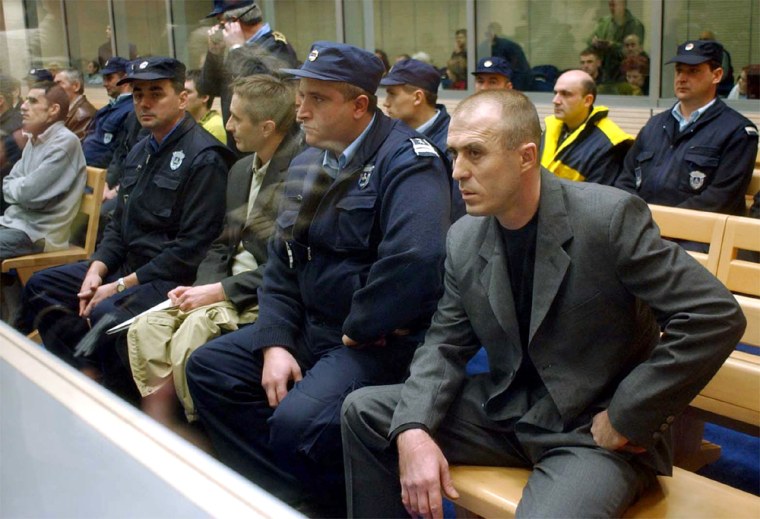Sitting stoically in a bulletproof glass cage, 21 suspected gang figures and members of an elite police unit went on trial Monday on charges of assassinating Serbia’s pro-Western prime minister in a plot to return Slobodan Milosevic’s allies to power.
The trial is seen as a test of the independence of Serbia’s judiciary after former President Milosevic’s autocratic reign in the 1990s.
Legal experts and human rights observers have raised questions about who ordered the March 12 sniper slaying of Zoran Djindjic, how many shots were fired and how prosecutors handled the indictment.
The indictment charges 36 suspects with allegedly forming a “criminal enterprise” that attempted to topple Djindjic’s government, though 15 suspects are at large and will be tried in absentia.
Among the fugitives is the alleged mastermind of the assassination, Milorad Lukovic-Legija, who commanded the elite “Red Berets,” during Milosevic’s brutal wars in Bosnia, Croatia and Kosovo in the 1990s.
Bid to retake power
Authorities say the sniper attack in front of the prime minister’s headquarters was part of a plan by Milosevic supporters to regain power after the former president was ousted by Djindjic’s pro-Western coalition in 2000 and extradited to the U.N. war crimes court in 2001 to face charges including genocide during the Balkan wars.
Defendants in the assassination trial could face up to 40 years in jail for charges including conspiracy against the state, terrorism and first-degree murder.
The proceedings started amid maximum security in a Belgrade court surrounded by concrete walls. Suspects were in handcuffs and each led by two policemen into the bulletproof cage.
Defense lawyers — some 80 in all — immediately demanded a recess, claiming the chief prosecutor, Jovan Prijic, attempted secret negotiations last week with some of the defendants, offering them shorter prison terms in exchange for cooperation.
The three-judge panel adjourned the session until Tuesday to consider the request to replace the prosecutor.
Among the first defendant expected to testify was Zvezdan Jovanovic, a Red Berets commander accused of firing two bullets that killed Djindjic and seriously wounded his bodyguard Milan Veruovic.
Veruovic added to the trial’s controversy last month when he told Belgrade’s media that he heard three shots being fired, coming from two different directions. That would mean that Jovanovic was not the sole assassin.
The indictment itself also raised questions among human rights advocates and other observers, in part because it failed to suggest who masterminded the slaying. Shortly after the attack, police and other authorities mentioned a “clear link” between Djindjic’s political rivals and the assassins.
Many enemies
“The indictment does not provide the answer to the main question that is troubling Serbia: Who ordered Djindjic’s assassination?” said Natasa Kandic, a human rights expert observing the trial.
Djindjic’s main foes included nationalists angered by his decision in 2001 to hand Milosevic over to the U.N. tribunal in The Hague, Netherlands.
War veterans — alarmed that they, too, might be extradited to the tribunal — allegedly plotted the assassination, together with the crime bosses who feared Djindjic would crack down on their lucrative drug trade, government officials said shortly after the assassination.
The shooting of the charismatic, German-educated prime minister — Serbia’s first democratic leader in 50 years — was a blow to his pro-Western government, which faces key parliamentary elections Sunday.
Opinion polls indicate the ultranationalist Serbian Radical Party, allied to Milosevic and accused by the authorities of approving Djindjic’s murder, might garner the most votes.
Trial opens on Serbian leader's murder
Twenty-one suspected gang figures and members of an elite police unit went on trial Monday on charges of assassinating Serbia’s pro-Western prime minister.

/ Source: The Associated Press